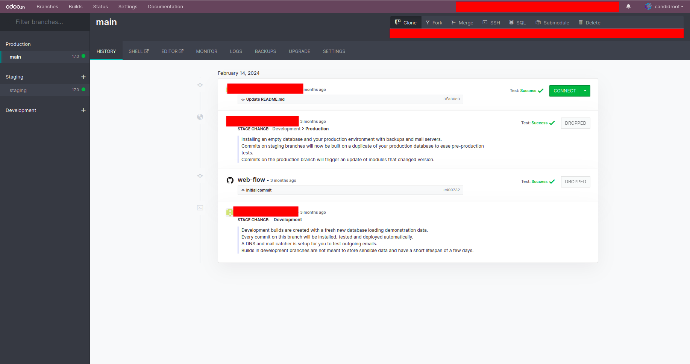Odoo, a powerful and versatile ERP solution, offers two primary hosting options: Odoo.sh and Cloud Hosting.
In this blog, we'll delve into the details of both choices to help you make an informed decision that aligns with your business requirements.
Understanding Odoo.sh
Odoo.sh is Odoo's Platform as a Service (PaaS) offering, providing a dedicated platform customized for Odoo deployments. It is a cloud-based service specifically designed to optimize the hosting and deployment of Odoo applications.
Key Features of Odoo.sh
- Automated Deployment: Odoo.sh streamlines the deployment process, making it faster and more efficient. Automatic updates and migrations ensure your system is always up to date.
- Isolation and Performance: Each Odoo.sh instance is isolated, providing dedicated resources for optimal performance. This isolation reduces the risk of interference from other applications or users.
- Scalability: Odoo.sh offers scalability to accommodate the growth of your business. You can easily scale resources based on your evolving needs.
Testing Environments: Multiple environments, such as testing and production, allow you to experiment with changes before implementing them in your live environment.
Pros of Odoo.sh
- Automated Builds: Experience seamless development workflows with automatic builds on each commit.
- Regular Backups: Enjoy peace of mind with regular database backups and manual backup support.
- Dedicated Runbot: Your project gets a dedicated Runbot for personalized and efficient support.
- Staging Control: Test freely without sending out emails from the staging branch.
- Multi-Version Support: Easily manage multiple Odoo versions simultaneously.
- Third-Party Integration: Seamless integration with third-party tools and custom apps.
Cons of Odoo.sh
- Higher Cost: The pricing is comparatively higher than VPS cloud solutions.
- Limited Root Control: Shared hosting means less control at the root server level.
How to Set up Odoo.sh?
- Create a GitHub Account : If you don't have one, sign up for a GitHub account. Odoo.sh integrates with GitHub for version control.
- Set Up, SSH Keys : You need to create SSH keys on your local system. Add them to your GitHub account. This ensures strong and secure communication between your machine and Odoo.sh.
- Access Odoo.sh : Visit the Odoo.sh website and sign in using your GitHub credentials.
- Create a New Project : Inside the Odoo.sh dashboard, create a new project. Define project details, such as the name and repository location.
- Link GitHub Repository : Link your GitHub repository to the Odoo.sh project. This establishes the connection for version control.
- Configure Project Settings : Adjust project settings as needed, specifying the Odoo version, database, and other relevant configurations.
- Initial Project Setup : Initiate the setup process, allowing Odoo.sh to configure the initial project environment. This involves setting up databases and installing necessary components.
- Deployment Workflow : Begin your development workflow. you can push changes to GitHub, and Odoo.sh will automatically trigger builds and update the environment.
- Test and Review: Utilize the testing environments provided by Odoo.sh to review your developments across different branches.
- Deployment: Once satisfied with your changes, deploy the project to make the modifications live.
It's important to note that the setup process might have additional steps based on specific project requirements and configurations.
Additionally, familiarity with Git and GitHub is beneficial for smoother integration with Odoo.sh.
As mentioned, Odoo.sh enables end-users to extensively test developments, handle brands, and try out features across various Odoo environments through GitHub.

Use your GitHub account with unique SSH keys, you can seamlessly merge, clone, and fork projects with just a few clicks. While this is ideal for businesses, individuals with limited technical expertise may find it challenging.
What is Cloud Hosting?
Cloud Hosting involves deploying Odoo on general-purpose cloud infrastructure provided by popular cloud service providers like AWS, Google Cloud, or Microsoft Azure. It offers flexibility, scalability, and a pay-as-you-go pricing model.
Key Features of Cloud Hosting
- Flexibility and Customization: Cloud Hosting provides the flexibility to choose your infrastructure components, allowing for more customization based on your specific requirements.
- Resource Scaling: With cloud hosting, you can easily scale resources up or down based on demand. This guarantees peak performance when demand is high and cost savings during periods of lower activity.
- Cost Efficiency: Cloud Hosting often follows a pay-as-you-go model, making it cost-effective for businesses, especially smaller ones, as you only pay for the resources you use.
- Global Reach: Cloud Hosting enables you to choose server locations globally, enhancing accessibility and user experience for a geographically dispersed user base.
Pros of Cloud Hosting
- Flexibility Galore: Scale resources as needed for optimum performance.
- Cost-Efficient: Pay only for what you use with a flexible pay-as-you-go model.
- Global Reach: Choose server locations globally for enhanced accessibility.
Cons of Cloud Hosting
- Potential Cost Fluctuations: Expenses may vary based on resource usage.
- Customization Challenges: Limited customization compared to dedicated hosting.
- Internet Dependency: Relies on internet connectivity for seamless operation.
How to Set up Odoo on Cloud Hosting
- Choose a Cloud Provider: Select a cloud provider such as AWS (Amazon Web Services), Google Cloud, Microsoft Azure, or others based on your preferences and requirements.
- Create an Account: Create an account with a cloud provider.
- Launch a Virtual Machine (VM) Instance: Use the cloud provider's dashboard to create a new virtual machine instance. Specify parameters like instance type, operating system, and storage.
- Install Odoo: Connect to your VM using SSH (Secure Shell) or the provider's web console.
Install Odoo on the VM. This typically involves updating the system, installing dependencies, and configuring Odoo. - Configure Firewall Rules: Adjust firewall rules to allow traffic to the necessary ports for Odoo (e.g., 8069 for the web interface).
- Set Up Domain and SSL (Optional): If you have a domain, configure it to point to your Odoo instance. Optionally, set up SSL for secure HTTPS connections.
- Database Configuration: Configure the Odoo database by specifying details such as the database name, user, and password.
- Additional Configurations: Depending on your requirements, configure additional settings such as email integration, user access, and modules.
- Test Odoo Installation: Open a web browser and navigate to the Odoo instance's IP address or domain. Verify that Odoo is accessible and works correctly.
- Regular Backups and Maintenance: Implement a backup strategy to regularly back up your Odoo data and configurations.
Stay informed about system updates and security patches for both the operating system and Odoo, and apply them as needed. - Monitor Performance: Set up monitoring tools to keep an eye on the performance of your Odoo instance, addressing any issues promptly.
- Scale Resources (Optional): Consider scaling resources like CPU and RAM to accommodate increased usage depending on your business growth.
- Consider Managed Services (Optional):
Some cloud providers offer managed services that can handle routine maintenance tasks, backups, and security updates.
It's essential to refer to the specific documentation provided by your chosen cloud provider for detailed instructions tailored to their platform. Additionally, staying informed about best practices and security measures for cloud-based Odoo installations is crucial for maintaining a reliable and secure system.
Here is a simplified comparison chart highlighting key differences between Odoo.sh and Cloud Hosting: - Table : Keep in mind that the choice between Odoo.sh and Cloud Hosting depends on your specific business needs, preferences, and customization requirements.
Choosing the Right Option for Your Business
Considerations for Odoo.sh
- Standardization: Odoo.sh is a standardized platform, making it ideal for businesses looking for a streamlined and consistent environment.
- Ease of Deployment: For businesses that prioritize quick and hassle-free deployments, Odoo.sh's automated processes can be a significant advantage.
- Dedicated Odoo Environment: If you want a dedicated platform exclusively designed for Odoo, Odoo.sh is tailored to meet those needs.
Considerations for Cloud Hosting
- Customization Needs: If your business requires specific infrastructure customization beyond what Odoo does.sh provides, Cloud Hosting may offer more flexibility.
- Cost Management: Cloud Hosting's pay-as-you-go model can benefit businesses focused on cost efficiency, especially during fluctuating usage patterns.
- Global Presence: For businesses with a global presence, Cloud Hosting's ability to choose server locations worldwide can enhance performance and user experience.
Conclusion
Ultimately, the choice between Odoo.sh and Cloud Hosting depends on your business requirements, preferences, and the level of control and customization you seek. Odoo.sh is a turnkey solution designed specifically for Odoo, ensuring simplicity and ease of use.
On the other hand, Cloud Hosting provides more flexibility and scalability for businesses with diverse needs.
Visit CandidRoot Solutions for expert guidance and seamless Odoo Implementation, ensuring you harness the full potential of Odoo's innovative business management tools. Transform the way you operate and set your business on a trajectory of sustained growth and success.
Related Post:


